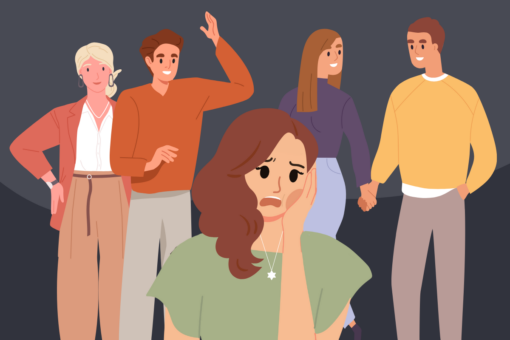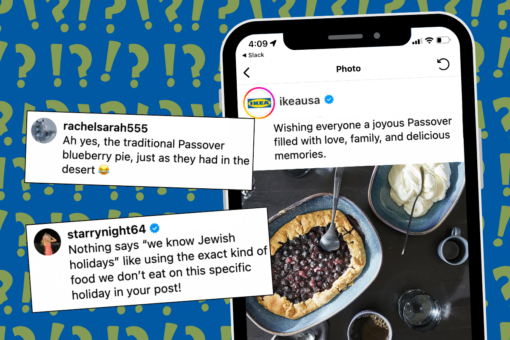My sister and I used to talk during synagogue services without making a sound. We achieved this magical feat by reading each other’s lips. We had an advantage: We were both born profoundly deaf and raised to lip-read and speak. Services were especially boring because we could only follow half of what was going on.
We were lucky enough, however, to grow up attending a synagogue that valued inclusion. I’m especially grateful for this now, because I’ve found as an adult there’s no consistency when it comes to accessibility in the Jewish community.
One day during kindergarten religious school, parents were invited to observe our class. When the teacher whispered in my ear, which did no good, as I need to see lips to understand, my parents almost went through the roof. That’s when my mom got involved in the temple’s special education program, because she wanted us to have the best experience possible.
After my bat mitzvah (needless to say, I didn’t chant my portion — a good thing for everyone!), I reluctantly joined youth group thanks to my mother’s pushing. To my surprise, it helped me break out of my shell, and I got much more involved than I ever thought I would. At the youth group advisor’s request, the temple purchased a TeleTYpewriter (TTY) so she could communicate with me when I assumed the mantle of president. (This is how we did things in the dark ages before the internet and smartphones!)
But I still had to speak up for myself often, whether it was reminding others to keep the lights on during a Havdalah service so I could see the speakers’ faces or asking performers to face me when reciting their lines. My sister and I weren’t the first or last congregants with disabilities, but we helped heighten everyone’s awareness.
When I joined my synagogue’s board five years ago, I was concerned, due to its large size, that it would be hard for me to keep up with the conversation. That worry was alleviated when I received a grant from the local Jewish Federation for remote real-time captioning, with the synagogue paying some of the cost. This meant that someone in another state was typing everything verbatim for me to read on my computer screen (she wasn’t even Jewish; I imagine some of the spelling was difficult).
Eventually, the hassle of setting up and taking down the system became too much for me. Now I push myself to speak up when someone’s covering his mouth. I’m not shy about asking a seatmate to repeat a question I missed. I like to think having me on the board has resulted in better communication overall.
But should it always come down to the people with disabilities to be the only ones advocating for ourselves?
Thankfully, there are some organizations in the Jewish world leading the way. The Ruderman Family Foundation is a good example, as it has become one of the leading voices advocating for disability rights in and beyond the Jewish community. In an interview with Jewish Journal this past July, president Jay Ruderman said of inclusion in synagogues, “Sometimes it’s a physical accommodation or sensory accommodation that’s needed. A lot of times it’s an attitude about what’s accepted and who’s accepted in synagogue. There are so many stories about people turned away from synagogues. You hear, ‘Oh, we can’t accommodate you here because your son or daughter is too disruptive.’ That’s just unacceptable. Humanity is very diverse. There’s some form of disability in many of us. Inclusion has made our Jewish community a better community.”
There are some other really great resources available online about inclusion, including Jewish organizations like Yachad and Matan. There’s also a webinar called “Inclusion & Pride: Interacting Jewish LGBTQ & Disability Advocacy” led by Rabbi Ruti Regan that is available online (and captioned!), which I highly recommend.
When I asked my synagogue’s new senior rabbi, Rabbi Aaron Meyer, about accessibility in the Jewish community, he said he’s excited about the young, progressive Jewish community embracing new forms of worship that open doors for inclusion. “We recognize that there is more work to be done,” he told me. “I worry that for too long we were not even cognizant of that fact, which prevented us from getting better.”
But you should ask: Is your synagogue accessible and inclusive? What can you do to make sure it is? Heed the words that Rabbi Regan said in her webinar: “Disabled Jews are part of the Jewish people; our community needs to act like it.”
Image via Annazuc/Pixabay



